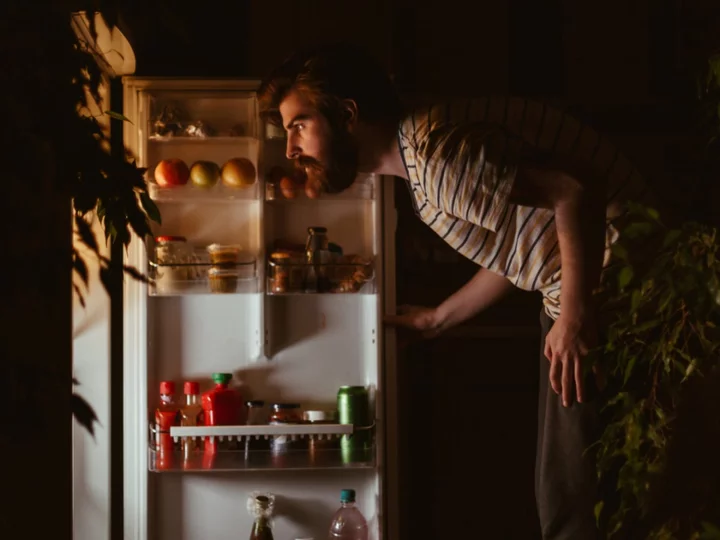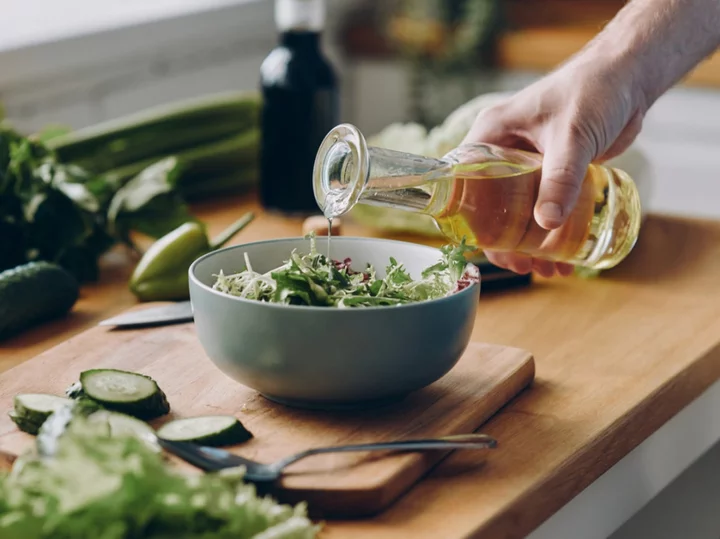
China Names Pan Gongsheng as New Central Bank Governor to Revive Economy
China named Pan Gongsheng as governor of the central bank, strengthening his position as head of the institution
1970-01-01 08:00

China Names Wang Yi New Foreign Minister to Replace Qin Gang
China’s Qin Gang has been removed from his post as foreign minister and replaced by his predecessor Wang
1970-01-01 08:00

3M Raises Outlook, Tops Estimates as Cost Cuts Gain Traction
3M Co.’s profit topped Wall Street estimates in the second quarter, driving a rise in the annual outlook,
1970-01-01 08:00

Roundup: Tori Kelly Rushed to Hospital; C.J. Stroud, Anthony Richardson Sign Contracts; Raiders Sign Marcus Peters
Tori Kelly rushed to the hospital, C.J. Stroud and Anthony Richardson signed rookie contracts, the Raiders signed Marcus Peters and more in the Roundup.
1970-01-01 08:00

Late night snacking could increase risk of diabetes and heart disease, study says
Eating a snack late at night carries significantly more negative health implications compared to snacking during the day, a new study has found. According to researchers at King’s College London, people who eat most of their snacks in the evening after 9pm saw larger spikes in their blood sugar compared to those snacked earlier in the day. The group who snacked later also had higher concentrations of fat in their blood compared to those who snacked earlier. The researchers studied data from 1,000 people who took part in the Zoe Predict study. The participants kept a food diary and wore blood sugar monitors in order to keep track of the impact of snacking. On average, they ate two snacks a day, with one in three “late evening snackers” eating most of their snacks after 9pm instead of between meals. High blood sugar and fat can lead to diabetes and heart disease, studies have found. People with diabetes are also more likely to have other conditions that raise the risk of heart disease, such as high blood pressure. The Zoe Predict project is a group of in-depth nutritional research studies that aim to reveal how and why people respond differently to the same foods. Kate Bermingham, a postdoctoral fellow at King’s College London and lead author of the study, said: “Surprisingly little has been published on snacking, despite the fact that it accounts for 20 to 25 per cent of energy intake. “Predict followed a large number of people and captured detailed information on their snacking behaviours, allowing this in-depth exploration of snacking on health.” Researchers analysed the relationship between the number of snacks participants ate, the quality of the snacks and the timing with blood fats and insulin levels. Snacking on higher quality foods, which are described as foods that contain significant amounts of nutrients relative to the calories contained, was associated with better bodily responses. The study concluded that the most important factor in determining the body’s response is the quality of snacks, not how often or how much they are consumed. Foods like fruit or vegetables resulted in a better blood fat and insulin response compared to processed foods, such as biscuits and cake. Bermingham added: “Our study showed that the quality of snacking is more important than the quantity or frequency of snacking, thus choosing high quality snacks over the highly processed snacks is likely beneficial. “Timing is also important, with late night snacking being unfavourable for health. This may mean that, universally, snacking late in the evening and interrupting the overnight fasting window is detrimental to health.” The study was presented at a meeting of the American Society for Nutrition. Read More My Taylor Swift exercise class has led me down a luxury fitness rabbit hole Husband fired from family business after wife roleplayed with reborn dolls MrBeast YouTuber Kris Tyson comes out as transgender: ‘I’m excited to authentically be myself’ Scientists share the 8 habits that impact your lifespan the most Cara Delevingne says her journey to sobriety has been worth ‘every second/ Bisexual people ‘experience worse health than other adults’
1970-01-01 08:00

GE Lifts Outlook on Surging Aerospace Demand, Renewables Rebound
General Electric Co. raised its full-year guidance and reported second-quarter results that blew past Wall Street’s expectations as
1970-01-01 08:00

Scientists share the 8 habits that impact your lifespan the most
Scientists have identified eight unhealthy lifestyle choices which, if changed, could see people live more than 20 years longer. Lack of exercise, opioid use and smoking have the biggest negative impact on lifespan and can lead to a 30-45 per cent higher risk of death, according to the study. Stress, binge drinking, poor diet, and poor sleep hygiene were each associated with around a 20 per cent increase in the risk of death. And a lack of positive social relationships was the eighth habit mentioned and is associated with a 5 per cent increased risk of dying. Meanwhile, a separate study suggests incorporating olive oil into your diet could help reduce the risk of dying from dementia. Consuming more than half a tablespoon of olive oil per day is linked to a 28 per cent lower risk of dying from the condition, compared with those who never or rarely eat the oil, researchers say. The findings from both studies were presented at Nutrition 2023, the annual meeting of the American Society for Nutrition being held in Boston, and may include more up-to-date figures than the data initially submitted for the meeting. The research that looked at lifestyle habits used data from medical records and questionnaires collected between 2011-2019 from 719,147 people enrolled in the Veterans Affairs Million Veteran Program. It found that men who have all eight healthy habits - including high physical activity and not smoking - at age 40 would be predicted to live an average of 24 years longer than men with none of these habits, and for women an additional 21 years. Xuan-Mai Nguyen, health science specialist at the Department of Veterans Affairs and rising fourth-year medical student at Carle Illinois College of Medicine, USA, said: “We were really surprised by just how much could be gained with the adoption of one, two, three, or all eight lifestyle factors. “Our research findings suggest that adopting a healthy lifestyle is important for both public health and personal wellness. “The earlier the better, but even if you only make a small change in your 40s, 50s, or 60s, it still is beneficial.” The researchers say their findings, which have not been peer-reviewed, highlight the role of lifestyle factors in contributing to chronic diseases such as type 2 diabetes and heart disease that lead to premature disability and death. In the olive oil study, scientists analysed dietary questionnaires and death records collected from more than 90,000 Americans over three decades, during which 4,749 people died from dementia. It also found that replacing just one teaspoon of margarine and mayonnaise with the equivalent amount of olive oil per day was associated with around an eight to 14 per cent lower risk of dying from dementia. Anne-Julie Tessier, a postdoctoral fellow at the Harvard TH Chan School of Public Health in the USA, said: “Our study reinforces dietary guidelines recommending vegetable oils such as olive oil and suggests that these recommendations not only support heart health but potentially brain health, as well. “Opting for olive oil, a natural product, instead of fats such as margarine and commercial mayonnaise is a safe choice and may reduce the risk of fatal dementia.” Research suggests that people who regularly use olive oil instead of processed or animal fats tend to have healthier diets overall. However, Dr Tessier noted that the relationship between olive oil and the risk of dying from dementia in this study was independent of overall diet quality. She added that the research is observational and does not prove olive oil is the cause of the reduced risk of fatal dementia. However, Professor David Curtis, UCL, said it was difficult to assess whether the research adds much to the understanding of links between diet, health and dementia risk, as it has not been peer-reviewed. He added: “There are many, many differences between people who consume olive oil and those who do not and it is never possible to fully account for all possible confounding factors. “Another point to bear in mind is that about half of dementia is caused by vascular disease so that anything which improved cardiovascular health, such as not smoking, would be expected to reduce dementia risk. “It has been shown that olive oil consumption is associated with better cardiovascular health so one would expect that it would also be associated with lower dementia risk.” Dr Duane Mellor, registered dietitian and senior lecturer at Aston University, said: “The authors claim replacing margarine and mayonnaise with olive oil could reduce risk. “However, many people who did this would also change the food that it is being added to, which could increase vegetable, lentils, beans, peas, seeds and nut intake – all of which are linked to a healthy diet and reduced risk of conditions like dementia. “We also need to remember that it is not just what we eat that helps maintain our brain function, it is how we eat – and remaining sociable around meal times and eating with others can benefit our mental health in the short term and cognitive function as we age.” Read More The bowel cancer symptom George Alagiah wished he’d caught earlier Experts share 8 healthy habits to help you live longer Husband fired from family business after wife roleplayed with reborn dolls Cara Delevingne says her journey to sobriety has been worth ‘every second/ Bisexual people ‘experience worse health than other adults’ The bowel cancer symptom George Alagiah wished he’d caught earlier
1970-01-01 08:00

Anthony Elanga joins Nottingham Forest on permanent transfer
Anthony Elanga has joined Nottingham Forest from Manchester United in a permanent transfer.
1970-01-01 08:00

Gilgo Beach witness questions why it took so long to make arrest after he gave tip that cracked case in 2010
Rex Heuermann’s arrest came as a shock to nearly everyone in the Long Island community of Gilgo Beach – but not for a man who came face to face with the alleged murderer and had reported him to law enforcement. For more than a decade, residents anxiously awaited new developments on a trail of murders that had gone cold, despite overwhelming evidence the slayings were the work of a serial killer. Most of the victims were sex workers in their 20s who went missing in 2009 and 2010 before their bodies were discovered wrapped in burlap along the stretch of a roadway. The Suffolk County police department led an unsuccessful 13-year investigation into the case amid a litany of internal scandals, before announcing earlier this month that Mr Heuermann was in custody. Police commissioner Rodney Harrison touted the work of a revamped task force as the reason behind the arrest, but largely glossed over the fact that the very detail that cracked the case was handed to authorities in the early stages of the probe. Dave Schaller told the Associated Press in an exclusive interview that, by the time Mr Heuermann’s mugshot was plastered on every local and national news channel on 13 July, he was very familiar with the Frankenstein-like figure with an “empty gaze” he had long ago described to investigators. In the winter of 2010, Mr Schaller told police that he had seen the man fleeing the house he shared with Amber Costello, whose body was among those found in Gilgo Beach. “When they told me she was dead, he was the first person who jumped in my head,” Mr Schaller told the AP. “I’ve been picturing his face for 13 years.” Mr Heuermann met with homicide detectives on multiple occasions during the initial years of the investigation. Two years after the bodies were found, Mr Schaller said he picked Mr Heuermann’s first-generation Chrysler Avalanche out of a line-up of photographs provided by the detectives. “I gave them the exact description of the truck and the dude,” Mr Schaller, who said he was angered by the delay in investigating his tip, told the AP. “I mean come on, why didn’t they use that?” Suffolk County district attorney Ray Tierney, who inherited the investigation when he took office in 2022, said the key to unravelling the case was the description of the truck, rediscovered by a state investigator after the launch of the new task force that took a fresh look at the evidence. Mr Tierney told the AP he did not know why police had not run a search earlier, but suggested the tip may have been “lost within a sea of other tips and information”. He stressed there were other elements that ultimately helped investigators arrest Heuermann, including new technology that helped match samples of DNA to the suspect. “This was a dark cloud over the community,” former police commissioner Tim Sini, who later became the county’s district attorney. “When you have the police department and the district attorney’s office blocking the FBI, that does not engender trust in law enforcement.” The arrest, Sini said, was the result of painstaking detective work that spanned multiple administrations and relied on a wide range of evidence. “[However,] I wouldn’t call it a major success. The case should’ve been solved earlier,” he said. “This was crucial information, and I don’t know why they didn’t share it,” Rob Trotta, a county legislator who worked as a Suffolk County police detective until 2013, also told the AP. “They made some serious blunders here.” Two high-ranking officials who worked closely on the case and attended briefings between 2011 and 2013 told the AP they never heard Mr Schaller’s witness statement. Mr Heuermann bought the pickup at a Chevrolet dealer on Long Island in 2002 and transferred ownership to his brother Craig in South Carolina in 2012. Authorities seized the vehicle last week. A search warrant stated investigators were looking for other clues in the vehicle or at property the brothers owned in Chester County, such as DNA, fluids, fingerprints, phones and what they described as possible “trophies” that may have belonged to the victims. Mr Heuermann is charged with the murders of Amber Costello, Melissa Barthelemy and Megan Waterman. He is also the prime suspect in the murder of Maureen Brainard-Barnes. As law enforcement closed in on Mr Heuermann, they served more than 300 subpoenas and search warrants that uncovered cellphone records for burner phones used to arrange meetings with three of the “Gilgo Four” victims before they went missing. Further analysis also allegedly linked Mr Heuermann to taunting calls made to family members of the victims, according to investigators. The calls were made from the Midtown Manhattan area, where the offices of Mr Heuerman’s architecture business are located. Among the evidence linking Mr Heuermann to the murders was a hair found on burlap material used to wrap Waterman’s corpse, according to court documents. DNA analysis had not been possible in the early stages of the investigation, but new technology allowed testing. A team surveilling Mr Heuermann collected a discarded pizza box that then confirmed a DNA match with the suspect on 12 June. Records also showed several online accounts under fictitious names linked to Mr Heuermann were used for illegal activities. Mr Heuermann allegedly used those accounts and burner phones to contact women for prostitution services, as well as making chilling online searches. The searches included sadistic, torture-related pornography, child pornography and disturbing content. Mr Heuermann is also accused of searching “why could law enforcement not trace the calls made by the long island serial killer,” “why hasn’t the long island serial killer been caught” and “new phone technology may be key to break in case”. Mr Heuermann has pleaded not guilty to all the charges against him. Authorities in New York, New Jersey, Connecticut, Las Vegas and South Carolina are looking into possible links between Mr Heuermann and unsolved cases. The Associated Press contributed to this report Read More Missing paddle boarder’s body pulled from Martha’s Vineyard pond next to Obama mansion Manhattan architect, family man and accused serial killer: Who is Gilgo Beach suspect Rex Heuermann? How the Gilgo Beach serial killer turned the Long Island shore into a graveyard
1970-01-01 08:00

A brand new Need for Speed game could be on the way
A new 'Need For Speed' game could be on the way less than a year after the latest game in the long-running racing franchise was released.
1970-01-01 08:00

Spotify Users Top Expectations Thanks to Gen Z Listeners
Spotify Technology SA, the Swedish audio streaming platform, beat analyst expectations in its second-quarter results with its total
1970-01-01 08:00

Ubisoft will not be closing inactive accounts despite emails
Ubisoft will not be closing inactive accounts despite viral tweets that they would be.
1970-01-01 08:00
